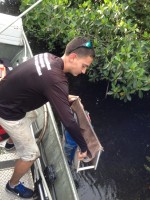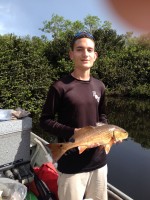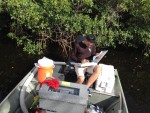My experience as a high school intern with the Long Term Ecological Research (LTER) program began as just a regular day in my biology class, with everyone paying attention to the teacher, Mr. Nicholas Oehm. After being in Oehm’s class for a year, he asked me if I was interested in doing an internship at a lab at the Florida International University, home of the Florida Coastal Everglades (FCE) LTER program, where he was the Education & Outreach Coordinator.
Going into the internship, I envisioned a brightly lighted room filled with people in white lab coats looking through a bunch of microscopes at something seemingly invisible. Well, at least that is what I thought it would be like. But that summer when I started at the lab under the supervision of Ross Boucek, a doctoral student at the university and the LTER Graduate Students co-chair, I was surprised to see a totally different picture from what I had imagined.
In the middle of the lab were around four fish tanks. To the left of the fish tanks sat a researcher who introduced herself as Vanessa. She was holding a small fish in her left hand and a plastic syringe in the other. I learned later that she was collecting blood samples used to analyze fish stress. I soon learned that I would be working with her, and although working with fish was completely different from the white lab coats and microscopes I had imagined, it promised to be an exciting adventure.
I started off by entering fish data for hours on Microsoft Excel. After about a month, I began to help with processing samples and preserving the stomach contents of some of the previously captured fish. While working in this LTER lab, I began to understand the scientific process, which was enhanced by my exposure to different scientists presenting their research every week at Monday lab meetings.
As I gained more experience, what began as a high school internship became a part time job. About once a month I got out of the lab and into the Everglades to collect data for specific projects. On my first trip to the field, we visited a recently dried wetland, now a field of saw grass, to collect data on small fish occupying natural holes in the limestone. On another occasion we set out on a little aluminum lab boat into the Everglades to catch fish using electrofishing techniques. That day I helped net some fish and record data for Boucek and Dr. Jennifer Rehage, a principal investigator at the lab.
Going out to the field is hard work but I do have the most wonderful time on those occasions. The trips to the Everglades are truly awe-inspiring: the scenery is quite spectacular, with beautiful mangrove trees rushing by as errant waves from the slough crash against the boat. With the Gulf of Mexico looking majestic in the distance and dolphins swimming by the side of our boat, not many people can say that their job is as cool as this.
Thus far my experience has not only been great, but I’ve also learned a lot about conservation science and ecology, lessons that have undoubtedly prepared me well for my next adventure as an undergraduate in college.

 Enlarge this image
Enlarge this image

